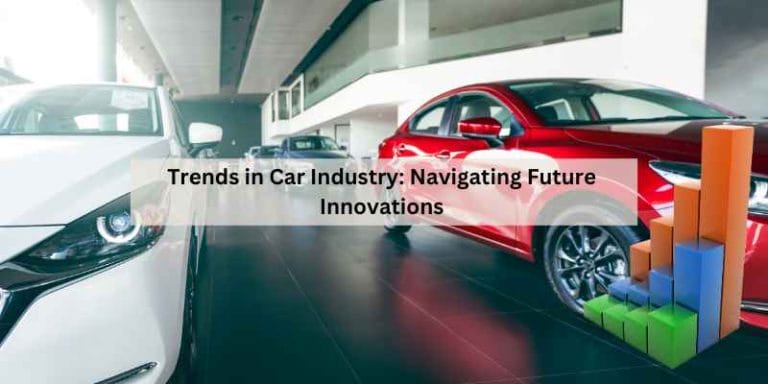Improve Car Technology: Enhancements for a Smoother Ride
Improve car technology by incorporating advanced features such as augmented reality, electric vehicles, automatic emergency braking, autonomous vehicles, backup cameras, driver alert systems, artificial intelligence, blind spot detection, and biometric integration. These advancements in automobile technology will enhance fuel efficiency, safety, and overall driving experience.
With the integration of IoT, AI, and digitalization, intelligent car technology has the potential to transform vehicles and offer advanced connectivity and smart capabilities. The automotive industry is constantly evolving, introducing innovations like self-driving cars and augmented reality dashboards. These groundbreaking technologies are revolutionizing the way we drive and paving the way for a seamless and intelligent future of transportation.
Stay updated with the latest car technology advancements to make the most of the evolving automotive landscape.
The Evolution Of Car Technology
The evolution of car technology has seen remarkable milestones, from traditional horsepower to the power of processors. The automotive industry has witnessed tremendous advancements, including augmented reality, electric vehicles, automatic emergency braking, and autonomous vehicles. Future changes in automobile technology are expected to bring increased fuel efficiency, sophisticated controls, and instruments to enhance safety. Adding new-car tech to existing vehicles has become a popular trend, with features like backup cameras, driver alert systems, and biometric integration becoming more common. Intelligent car technology, driven by IoT, AI, and digitalization, is transforming vehicles and offering advanced connectivity and smart capabilities. The modernization of systems and software is leading to more intelligent vehicles, improving driving experiences and propelling the industry forward. From self-driving cars to augmented reality dashboards, the latest car technologies are groundbreaking, shaping the future of automotive technology.
Electric Dreams: The Rise Of Evs
The development of electric vehicle (EV) technology has accelerated in recent years, leading to significant advancements in battery technology. Innovations such as solid-state batteries and improved energy density are revolutionizing the performance and range of EVs. These breakthroughs are paving the way for a future where EVs offer comparable driving ranges to traditional internal combustion engine vehicles.
The expansion of charging infrastructure is crucial to the widespread adoption of EVs. Investments in fast-charging stations and home charging solutions are key to addressing range anxiety and encouraging more consumers to make the switch to electric mobility. Rapid advancements in charging technologies are making EVs more convenient and accessible for daily use.
Towards Autonomy: Self-driving Vehicles
The future of car technology is headed towards autonomy with self-driving vehicles leading the way. Sensor and software advances have made it possible for cars to navigate roads and traffic, detect obstacles and make decisions based on real-time data. However, regulatory and ethical considerations need to be addressed before autonomous vehicles can become a common sight on the road. Governments and industry leaders must work together to establish guidelines for safety and liability in case of accidents or malfunctions. Additionally, privacy concerns must also be taken into account as self-driving cars collect and transmit data about their surroundings and passengers. As technology continues to improve, the future of car technology will undoubtedly be exciting and transformative.
Enhanced Safety Features
Enhanced car technology brings automatic emergency braking and advanced driver-assistance systems to the forefront of vehicle safety features. These advancements utilize artificial intelligence and biometric integration to provide real-time safety alerts and intervene when necessary. Automatic emergency braking systems are designed to detect potential collisions and automatically apply the brakes to prevent or mitigate the impact. Additionally, advanced driver-assistance systems incorporate features such as blind spot detection and driver alert systems to enhance overall safety on the road. These technological innovations are revolutionizing the automotive industry, making vehicles safer and more secure for drivers and passengers alike.
The Integration Of Ai And Machine Learning
The integration of AI and machine learning is revolutionizing car technology in Austin, Texas and beyond. With advancements such as augmented reality dashboards, autonomous vehicles, and automatic emergency braking, cars are becoming more intelligent, connected, and safe. These innovations are paving the way for a future of electric and environmentally friendly transportation.
| The Integration of AI and Machine Learning |
|---|
| Car technology has come a long way in recent years, and the integration of AI and machine learning is set to revolutionize the driving experience. One of the most exciting developments is the potential for a personalized in-car experience, with vehicles learning about their drivers’ preferences and adapting accordingly. This could include everything from the temperature and lighting to the music and even the route taken. Additionally, AI and machine learning can be utilized for predictive maintenance and diagnostics, allowing for early detection of any issues and more efficient and cost-effective repairs. With these advancements, we can expect a safer, more enjoyable, and more efficient driving experience in the near future. |
Connectivity And Infotainment
Car technology is constantly evolving and improving, with a focus on connectivity and infotainment. Smartphone integration has become a standard feature in modern cars, allowing drivers to easily access their phone’s features through the car’s interface. Next-generation navigation systems have also been developed, providing more accurate and real-time information to drivers. In addition, there are many new technologies being developed and implemented in cars, such as augmented reality, electric vehicles, automatic emergency braking, autonomous vehicles, backup cameras, driver alert systems, artificial intelligence, blind spot detection, and biometric integration. These advancements are aimed at improving safety, efficiency, and the overall driving experience.
User Experience And Comfort
Improving car technology is crucial for enhancing user experience and comfort. The ergonomic design of modern cars focuses on providing better support and comfort for drivers and passengers. Climate control innovations have revolutionized the way we regulate the interior temperature of vehicles, ensuring a more pleasant and comfortable journey. These advancements contribute to a more enjoyable and relaxing driving experience, ultimately improving the overall satisfaction of car users.
Future Trends And Concept Cars
Discover the future trends and concept cars that aim to improve car technology. From electric and autonomous vehicles to augmented reality dashboards and artificial intelligence integration, the car of the future promises benefits such as reduced pollution, increased safety, and enhanced connectivity.
Stay updated with the latest innovations shaping the automotive industry.
| Future Trends and Concept Cars |
|---|
| With the advancement of technology, the automotive industry is constantly evolving. Materials and manufacturing processes are being developed to create more efficient and sustainable vehicles. Visionary designs are being implemented to create concept cars that showcase the future of the industry. |
| The future of cars is set to be electric, autonomous and connected. As a result, we can expect to see a range of new technologies being developed to support these changes. Augmented reality, electric vehicles, automatic emergency braking, blind spot detection and biometric integration are just a few of the technologies that we can expect to see in the future. |
| Manufacturers are also focusing on improving fuel efficiency and safety features. Controls and instruments are becoming more sophisticated and intelligent, contributing to the overall safety of the vehicle. |
| The automotive industry is constantly changing and evolving to meet the demands of society. With the implementation of new technologies and designs, we can expect to see a future with less pollution, more safety, and more free time and services. |
Overcoming Barriers To Adoption
Improving car technology involves addressing various barriers to adoption. Cost considerations often influence consumer attitudes and education. Consumers need to understand the benefits and long-term savings electric, autonomous, and connected cars can offer. Emphasizing increased fuel efficiency and safety features can also help change perceptions. Moreover, integrating artificial intelligence and biometric integration can enhance the appeal of modern car technology. Educating consumers about the advantages of automatic emergency braking, backup cameras, and driver alert systems is crucial. By highlighting the positive impact on safety, convenience, and environmental factors, the automotive industry can overcome barriers to the adoption of advanced car technology.
Sustainability And Environmental Impact
Reducing emissions from vehicles is crucial for environmental sustainability. The development of electric vehicles and the use of alternative fuels are effective strategies for achieving this goal. Additionally, the implementation of cleaner engine technologies and the promotion of public transportation can contribute significantly to reducing harmful emissions.
Enhancing recycling and reusability in car manufacturing processes is essential for minimizing environmental impact. The use of recycled materials in vehicle production, along with the remanufacturing of components, can significantly reduce the consumption of raw materials and energy. Moreover, fostering sustainable disposal practices for end-of-life vehicles is crucial for minimizing environmental pollution and promoting a circular economy.
Frequently Asked Questions
What Is The Future Technology Of Cars?
The future technology of cars is focused on electric, autonomous, and connected vehicles. These cars will offer benefits such as reduced pollution, increased safety, more free time, and additional services. Changes in automobile technology will also include improved fuel efficiency and advanced controls for enhanced safety.
What Are Future Changes In Automobile Technology?
Future changes in automobile technology include increased fuel efficiency, advanced controls for enhanced safety, electric vehicles, autonomous driving capabilities, augmented reality dashboards, automatic emergency braking, backup cameras, driver alert systems, blind spot detection, biometric integration, and the use of artificial intelligence.
These advancements aim to reduce pollution, improve safety, save time, and offer additional services to society.
Can You Add Technology To A Car?
Yes, you can add technology to a car. Some examples of car technology include augmented reality, electric vehicles, automatic emergency braking, autonomous vehicles, backup cameras, driver alert systems, artificial intelligence, blind spot detection, and biometric integration. These technologies are constantly advancing and improving the driving experience.
What Is The New Technology In Cars 2024?
The new technology in cars by 2024 will include electric and autonomous vehicles that are connected to various services. These cars will offer benefits such as reduced pollution, increased safety, and more free time for the passengers. Future changes in automobile technology may also include increased fuel efficiency and advanced control systems.
Overall, the car of the future will be a combination of innovative features to enhance the driving experience.
Conclusion
Improving car technology is crucial for the future of the automotive industry. By embracing electric, autonomous, and connected vehicles, we can reduce pollution, enhance safety, and provide more convenience to drivers. From augmented reality dashboards to automatic emergency braking, the latest car technologies are revolutionizing the way we drive.
As we continue to modernize and innovate, it’s important to prioritize the development of sustainable and efficient technologies that will shape the future of transportation. Together, we can create a smarter, greener, and more advanced automotive world.

